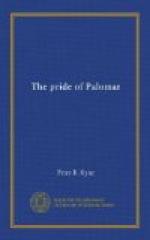“She ees one of those leetle lady-pistols, Don Miguel. She can’t kill somebody if she try,” he declared, contemptuously. Murray pouched the dollar gratefully and beat a hurried retreat.
From under his denim jumper, Pablo brought forth a pint of claret.
“When the damned proheebeetion she’s come, you father hee’s sell fifty cow and buy plenty booze,” he explained. He broke off into Spanish. “This wine, we stored in the old bakery, and your father entrusted me with the key. It is true. Although it is not lawful to permit one of my blood to have charge of wines and liquors, nevertheless, your sainted father reposed great confidence in me. Since his death, I have not touched one drop, although I was beset with temptation, seeing that if we did not drink it, others would. But Carolina would have none of it, and, as you know, your father, who is now, beyond doubt, an archangel, was greatly opposed to any man who drank alone. How often have I heard him declare that such fellows were not of the gente! And Carolina always refused to believe that you were dead. As a result, the years will be many before that wine is finished.”
“My good Pablo, your great faith deserves a great reward. It is my wish that, to-night, you and Carolina shall drink one pint each to my health. Have you given some of this wine to the Parkers?”
Pablo shook his head vigorously.
“That fellow, El Mono, was desirous of serving some to his master, and demanded of me the key, which I refused. Later, Senor Parker made the same demand. Him I refused also. This made him angry, and he ordered me to depart from El Palomar. Naturally, I told him to go to the devil. Don Miguel, this gringo grub appears to be better than I had imagined.”
Farrel had little appetite for food, but, to please Pablo, he drank the soup and toyed with a piece of toast and a glass of wine while the majordomo related to him the events which had taken place at El Palomar since that never-to-be-forgotten day when Tony Moreno had ridden in with the telegram from Washington.
“Your beloved father—may the smile of Jesus warm him!—said nothing when he read this accursed message, Don Miguel. For three days, he tasted no food; throughout the days he sat beside me on the bench under the catalpa tree, gazing down into the San Gregorio as if he watched for you to ride up the road. He shed no tears—at least, not in the presence of his servants—but he was possessed of a great trembling. At the end of the third day, I rode to the mission and informed Father Dominic. Ah, Don Miguel, my heart was afflicted tenfold worse than before to see that holy man weep for you. When he had wept a space, he ordered Father Andreas to say a high mass for the repose of your soul, while he came up to the hacienda to remind your father of the comforts of religion. Whereat, for the first time since that vagabond Moreno




